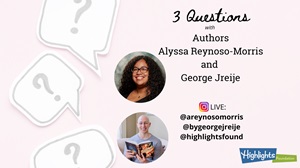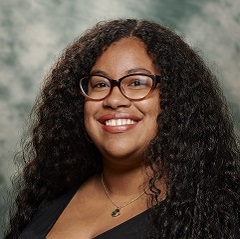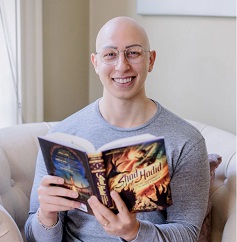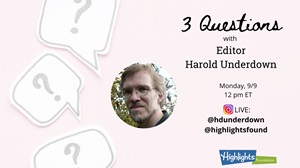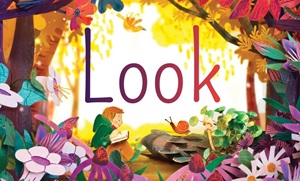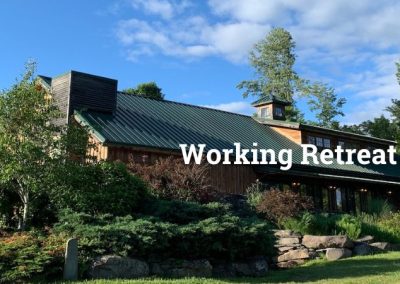Social Media Manager Cat Galeano joined Alyssa Reynoso-Morris and George Jreije on Instagram Live to talk about author/illustrator school visits and events.
Watch the conversation or read the full transcript below. (Please note: closed captions are being added to the video below. When they are finished, you can see them by hovering over the bottom of the video and choosing the “CC” icon.)
Full Transcript:
Cat:
A big hello to our Highlights Foundation family. We’re so happy to have you here with us today, this afternoon. For those that may not know me, I am Cat Galeano, my pronouns are she/her; and I’m the social media manager here at the Highlights Foundation, joining you from Westchester, NY on the traditional lands of the Seewanoy people. And apart from all the fun things I get to do at the Highlights Foundation, I am also a writer and a reader myself, so I’m very, very excited to welcome our friends and faculty, Alyssa Reynoso Morris, who will be teaching the two night mini Getting the Gig On Speaking Oportunities for Sorytellers, coming up on August 6th and 8th and George Jreije, who will be leading Successful School Visits, a 3-part online course on August 28th with also special guests. Their upcoming courses are beneficial to all creatives, so I am thrilled to welcome both of them and to be able to chat with them today.
However, but with, but before we dive into our questions, I want to remind our viewers that joining in on any Highlights Foundation sessions, to do so with no hate, no harm and no harassment of any kind.
So let’s get started. My very first question is: part of being an author and illustrator is getting out there to get your books to the kids. Why have you both made visits and events a big part of your marketing strategy?
Alyssa:
I’ll let George take this one first.
George:
Sure. Yeah, there, there really are two ways to reach children. It’s talking to them directly and also write, writing stories for them, and that’s; we love to do both. Sometimes they can be really scary to make the jump to actually facing with them directly, and sometimes that can be challenging as well, but I really love to do it because it allows kids two things, right? The first is to put a face to the name that goes generally at the bottom of the books that they’re reading. And that makes a huge difference. Because it really normalizes this idea of: authors are just like you. We’re not special or, or better, or we’re not trying to do anything other than what they’re trying to do. And I think that makes books a lot more accessible and safe because some books can feel inaccessible. Sometimes they felt inaccessible to me as a child to a degree. And the other thing is it helps the folks who are around kids feel more comfortable with you know, the, the, the material, the authors. You know, sometimes people have pre-held beliefs and when you can get through those people and get by those beliefs the whole community around them kind of rallies around these books that you know, we’re trying to really get in those children’s hands. And I know that we’ve seen that be a struggle more and more in this divisive times. But events are a great way to do that and to face directly with those people. Because, again, children are not necessarily the end buyers of books always. Because hildren don’t necessarily make money like parents, librarians and teachers. And so we’ve got to get to them too.
Alyssa:
Yeah. And the only thing I would add to that is as a children’s book author specifically, it’s important to be strategic and think about where your target audience is. And while it’s great to partner with bookstores, while it’s great to, you know, like figure out a way to go to conferences like ALA and things like that, there’s schools everywhere you go, and so being able to reach these schools is an opportunity for you to share your book, share your message and you’re doing it directly to the students. Like in one school visit, you can meet literally hundreds of students. I remember one of my biggest assemblies I met with like 700 kids in one day, so as opposed to like, if you’re organizing an event you have to specifically market it and it can be a more daunting task. So schools are a great way to be able to reach your target audience directly, oftentimes. If the school is very lik,e senior and has done it before, they send information home so that parents know, hey, this author’s coming in. This is their book and you can order the book ahead of time and they’ll sign the copies. Or sometimes the schools buy the book. So it’s, it’s a nice way to reach the audience, sell some books and also potentially make some money because there is an honorarium that you can also get during those types of visits.
Cat:
And then those…
George:
Yeah, really good point by the way, the honorarium because it’s, it’s, it really is only win-win for everyone when you do like school visits, school events and things like that.
Cat:
It’s a hundred little, little minds running off home and telling their parents: “Oh my gosh. I met this person, I learned this” and there really is something so incredibly powerful about seeing the face behind the person that wrote the thing you’re holding. Like I remember so vividly being a child and being: somebody actually wrote this and like, Oh my God, that’s the person who’s there? Like it is just such a mind-blowing concept. And not to say that, like these kids are gonna go off and run and be writers. But still the power of seeing like a different job, per se. And like the talent that did the thing that they’re holding. It’s just those powerful moments, really stick with a child, so I totally second and appreciate everything you shared about visiting schools and kids and events, of course. My second question is: is there any aspect of all of this that you do out in the world that is still nerve-wracking or tough for you?
George:
Alyssa, you want to take this one first?
Alyssa:
I would have to say, trying new material is always super scary, you know. Especially like, I write picture books mostly and so my first book Platanos Are Love, I’ve read it hundreds of times, so I feel really confident reading that one, you know, and I basically have the whole thing memorized, and I more or less know how kiddos are gonna react to it. It’s always different because every group of students is different, but for the most part I can kind of gauge like what they’re going to get, like how they’re going to react to certain parts of the book. But trying, like, new material and reading a new book for the first time, I always, I’m super super nervous because so much of the writing process is done in isolation and you hope the book is going to land a certain way. But you don’t really know until you’re reading it to them, and so, yeah, like my, my third book just came out a couple weeks ago and my first school visit that I did was like a summer camp kind of thing. Reading it, I was like, sweating, and you would think I’ve never done it before and I’ve literally done it hundreds of times. But it’s really scary, like, reading your first, like reading something new for the first time. You’re not sure how it’s going to land.
George:
Yeah, I love that. I, I definitely empathize with that feeling. I’ll say two things. The first is that designing a presentation that will resonate with children can be difficult because there are things that as adults we think are important, but we have to be able to empathize with our audience, as Alyssa was talking about and make sure that message is received and is received in an engaging way. And our courses kind of help with that. What they also help with–and this is something that, you know, continues to be a very dynamic and evolving thing–navigating contracts and navigating those discussions with the schools themselves to kind of get into this school as well as get paid.
There’s a whole, there’s a whole conversation amongst authors around how to best navigate that. And I think the Highlights Foundation does a great job of offering resources and expertise so that folks who have question marks around those particular areas can get that clarity.
Cat:
That’s such a great point, because like as creative you know, we’re so concentrated on a) the actual work that goes into the book and then 2) like, preparing the presentation to go in. And then you know, oftentimes, some of us are introverts, so it’s already a big deal just like for our own selves to be in this sort of exposed situation, but then of course, like the legality and the contracts and the business side, that gets extremely overwhelming. You’re just like, ah, I don’t wanna do anything anymore. Which is why like these courses are so important. Because again, like sometimes you don’t even think of that side of it and you’re just like: I just want to get to publishing book birthday day! Only to realize the other hurdle on the other side is all of these things. So thank you for sharing that. So important, yeah, to hear that from both of you.
Alyssa:
Yeah, I’m glad you mentioned that because like, especially in our society, we don’t talk about money, you know, just in general. Like I remember my first job out of college, like you’re not supposed to talk about how much you make. And I feel like just culturally, we don’t talk about money enough. So we kind of like, areadverse about talking about money. And it feels really icky. But you have to do it. You have to talk about money. You have to talk about your rates. You have to like, you have to do it and definitely our courses will be able to help y..ou navigate that icky process so that it’s like.
George:
We’re transparent about everything when it comes to, I think our own operations. So we want to impart that on our students.
Cat:
Yeah. Oh man, I will definitely be tuning in on the side and sneaking a peek of these courses. While I’m not there yet, I want to at least be knowledgeable enough that when I get there, I don’t feel like: oh, what is happening? Because I love to tell this story to people that I did my MFA in writing–sort of like a back story–and writing for children. But the most embarrassing thing about graduating from my program and you know feeling like I had accomplished some sort of manuscripts and like, I’m like, yes! I’m going to do the thing. I, embarrassingly enough, didn’t know how to write a query letter. Didn’t really know what the word query meant. That is how embarrassed I was, that I had no idea. So it’s like these courses are so important because like, you need to be able to find a safe space to ask these questions about rates, about contracts, about you know, how to put together a presentation for kids and as a, as a school versus an event. You know, with adults or with a, a bookstore. So, I’m just so grateful that we are offering these kinds of courses because, you know. there’s not that many of those, these style of courses out there and like you know, we are ultimately all writers trying to get the thing made, to make a living, to continue doing the thing, yeah. So like I’m just so…
Alyssa:
Don’t feel bad. I know so many MFA programs that they focus so much on the craft so that you write a really good story, which is great, but I don’t think enough MFA programs teach about the business component. Which is super-important because at the end of the day it is a business so. Don’t. I’m glad that you shared that because I think it’s way more common than, than realized.
Cat:
I always tell people like I’m going to tell you a really embarrassing story as someone that comes from a snooty program. But it’s not all it’s cracked up to be because I didn’t even know what the word query, or how to query, or how to write a query letter was. So I mean, I’m much better at it now, but honestly, like talking about it, being transparent like that, I feel like is so key and I think it’s also a really beautiful thing about the kidlit community that we sort of have that, that thing within each other that we like to to watch out for each other.
George:
Absolutely.
Alyssa:
Absolutely. Yes.
Cat:
So my next question, which is already my last question, which makes me mad, is what’s been your favorite memory from speaking to or interacting with kids about your books?
Alyssa:
I’ll put you in the hot seat, George.
George:
Honestly, it’s, it’s the post-speaking Q& A and like just chatting with the students. Once you’ve developed that rapport and they’re like: this is my friend. This is not just author person that school paid to come in here like you know, the pro baseball player or something, right? Like knowing that we are here for them and that we do everything that we do for them. They just–the barrier collapses and you can have some really just meaningful deep conversation. And that is my favorite part of any visit, and that applies to not just the students, but also the teachers and like librarians, who they themselves have questions. And they themselves want to learn things and just interacting with the whole community around books is so fulfilling.
Alyssa:
Yeah, I, I’d have to echo that for me. Like I measure success based on how many hugs I get at the end. It’s like kids, so like adults are cool and everything, but like, kids are so much better than adults. I’m sorry like, if anyone listening gets offended by that. But like kids are so honest and like they will, they don’t hold back the way that adults do, right? Like they don’t fully understand, like the way that you’re supposed to act, they’re not overthinking it. It’s like their reaction is just so genuine and so like pure and like they really respond when you’re authentic. Though for me, when I do school visits, I’m in my element because I get to be like my weird hyper-quirky self that did not survive corporate because I was too much and I’m in these spaces with these kids. And the whole message behind most of my writing is that they are enough and they remind me during those school visits that I am enough too. Because when I’m interacting with them, I can be myself, unapologetically. And it just feels really cool to like be yourself, and then at the end of your presentation, getting like bombarded by like 20,000 hugs, right? And like after like school visits I always, like, cry. But like in, like good, happy tears. Because I’m like yes, I did it like this is not just my job. It’s not just my career. This is my calling because every time I do a school visit, I feel my battery is completely recharged and I’m like OK. This tells me: power through the rejections because you know, I’m still querying. I mean, I’m, I’m still on submission with other books and it makes it all worth it when you see the impact that you’re making in these kids’ lives. It’s, it’s always really cool when kids come up to me and they’re like, that’s like when they resonate with the characters. And they’re like: that’s me. That’s me in the book. And it’s like: mission accomplished. That’s exactly what I was going for. So yeah, just seeing their reaction and like how excited they get and kids are just better than adults, so…
George:
And I, I frequently get kind of notes from new authors who, just like, they’re nervous about doing their first school visit. And I always tell them, like you have to do at least one school visit just to really experience that connection. And once they do, they write back and they say this is life-changing. This is exactly why I do what I want to do.
Alyssa:
Exactly.
George:
And it totally flips that perspective around. It’s one thing to think about writing for children in the abstract. It’s another thing to actually experience the effect of what you’ve written. And once they get the bug, they love it. A lot of those nerves fall away and it is just a wonderful thing. But it’s just a matter of crafting our presentation and finding the way to execute that.
Cat:
Yeah, I feel like there’s also nothing like positive, unfiltered little minds coming at you with good things. And they’re just like, all talking over each other, and you’re just like, soaking it in like a sponge and like Alyssa said, like recharging my battery to keep doing it. Well, thank you both. And if you’d like to join Alyssa… Oh, first of all, before I do my outro, is there anything you’d like to tell people about your courses? Kind of preview? Before we like wrap up, wrap up.
George:
I’ll just say if you have questions? Reach out directly, like we’re happy to answer any questions you have,on Instagram or otherwise. Don’t be a stranger. Don’t be, don’t be shy.
Alyssa:
Yeah, I’m excited to take your course too. I, I feel like there’s so much that we can learn from each other and for the record, like my background was not in marketing, my background was not in like publicity or anything like that. But I’ve learned so much from other authors. And then, you know, been able to do it successfully. And it, when I think about it, it’s like kind of nuts. But like last year alone, I did 67 visits. You learn a lot during, during that time. So learn from our mistakes. Let us make the process as painless as possible so that you can soak in all the love and all the hugs without having to worry about the anxiety that comes along with the business component.
Cat:
I think that’s actually great that you mentioned that cause like there is a thing as, as burnout, as doing too much. So I think that’s great that you’re like mentioning that too. You’re like, what is kind of the sweet spot for you because like my sweet spot could be different from George’s and versus yours. So it’s like, it’s good to, to, to have that conversation about, you know, to not all of a sudden just like, be lying on the floor like I can’t function. I’m so tired.
So we’re going to officially wrap it up now, like and so if you’d like to join Alyssa for Getting the Gig, A Two-Night Mini On Speaking Opportunities for Storytellers, this is taking place on August 6th and 8th. And if you’d like to join, to join George on Successful School Visits: A 3-Part Online Course, that will be kicking off at the end of August, on the 28th. You can register for both of these classes on our website, highlightsfoundation.org and lastly, you can purchase Alyssa and George’s books at our Virtual Bookshop powered by bookshop.org. Thank you so much, George. Thank you so much, Alyssa, for joining us today. And thank you everyone for coming in and stopping in. Whether you’re watching live or you’ll be watching later, we’re so happy that you have that we have you. And we can’t wait to see you online.
George:
Yeah. Thanks everyone.
Cat:
Bye everyone.
Alyssa:
Thank you!

